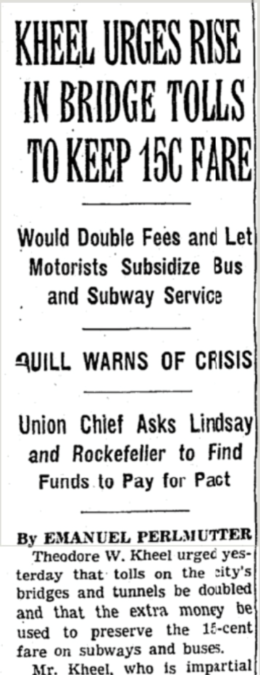TED KHEEL FINALLY BEATS ROBERT MOSES – CONGESTION PRICING AND THE 50 YEAR WAR TO PUT SUBWAYS OVER CARS

The November 8, 1965 front page of the New York Times blared a headline that sent Robert Moses into fits: Kheel Urges Rise in Bridge Tolls to Keep 15 Cent Fare; Would Double Fees and Let Motorists Subsidize Bus and Subway Service.
The Kheel in question was Theodore “Ted” Kheel, then the labor negotiator charged with avoiding a meltdown between the Transit Workers Union and the City, which at that time controlled the New York City Transit Authority. Kheel wanted to solve a looming dispute between Mike Quill, the legendary labor leader who had presided over the transit union since Fiorello LaGuardia, and newly minted Mayor John Lindsay. But Kheel had a larger goal in mind: rolling back the dominance of the automobile that had driven city development in the post World War II period and bolstering the ailing mass transit system that he saw as the lifeblood of a working class city.
His proposal – tax cars to provide better and cheaper subway and bus service- was revolutionary at the time. “By increasing the toll fares, it would be possible, first of all, to produce additional revenue to subsidize mass transportation”, Kheel told the Times. “And secondly, it could very well affect the distribution of riding and encourage more people to use the buses and subways”. The Times noted that this was the first time such a proposal had been made, and suggested that “such action [would] discourage motorists from coming into the City”.
Reaction from Robert Moses, Chairman of the Triborough Bridge and Tunnel Authority and architect of the region’s automobile centric development, was swift and dismissive. “The diversion of toll revenues could offset only a very small part of the deficits of the commuter and rapid transit railroads, would not solve any of their major problems, and will merely deprive the motorist, who foots the bill, of the facilities he requires to function”.
Kheel lost the immediate battle (though cross subsidies became a reality when the State took over both the TBTA and NYCTA and merged them within the newly created MTA in 1968). For the next 40 years, Kheel devoted his considerable intellect to a vision of a city less imprisoned by cars and more democratized by cheaper and better mass transit. “Transportation,” said Kheel in 1969, “is as much a civil rights issue as housing and education and jobs.”
In 2007, the 93 year old Kheel, doubled down on a new revolutionary idea: congestion pricing, or what he deemed a “cordon fee” for cars and trucks entering Manhattan. Spending $100,000 out of his foundation, Kheel produced a study that showed that a dramatic increase in the cost to bring vehicles in Manhattan would produce enough revenue to eliminate the subway fare (then $2.00) – and reverse the choking influx of traffic into the city. “This is one of the major issues of our time, Kheel told New York Magazine at the time. “I’ve never seen the automobile traffic as dense as it is, and the cost of that is tremendous.”
By shifting costs to automobile drivers, Kheel saw a benefit to both subway riders and drivers, as well as the quality of life in the City as a whole. Kheel estimated that his plan would increase vehicle travel times in the central business district by 34%, and generate billions in time savings from more fluid street traffic. “Congestion pricing is fine”, Kheel told the New York Observer. “But it should be accompanied by inducements for people to use mass transportation and to that end, we will be recommending that mass transportation be free, and we believe the numbers will show that free mass transportation will lead to a balanced system of moving people around this great city.”
Kheel saw his proposal for free mass transit dismissed as utopian and naive. But he always believed both prongs – raising vehicle fees to reduce congestion and provide zero fare subways- were essential. Mayor Bloomberg championed a version of the congestion pricing prong of Kheel’s proposal but it too succumbed to a lack of political will among lawmakers in the City and Albany.
This week, 53 years after Kheel first proposed turning car drivers pain into transit riders gain, the Governor and the legislature agreed to implement the nations’ first congestion pricing system in New York City. Governor Cuomo muscled congestion pricing home, but New Yorkers owe a debt of gratitude to the Ted Kheel, the civic godfather of congestion pricing who presided over a generation-spanning effort to elevate mass transit over the automobile.
Kheel’s second prong -free subway fares subsidized by vehicle’s operating in the city- was never seriously considered in the latest debate. But Kheel would be undeterred. As he wrote in 2008, “The twin concepts of congestion pricing and free transit are seedlings, only recently planted. They make too much sense, however, not to take hold. I predict that fifty years from today, these ideas will seem as mundane as my 1965 suggestion that revenues from Moses’ TBTA be applied to subsidize mass transit”.
Howard Glaser
2018 Theodore Kheel Fellow for Transportation Policy, Roosevelt House Public Policy Institute at Hunter College

